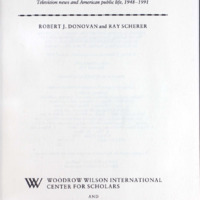-
Title
-
Unsilent revolution : television news and American public life, 1948-1991
-
Description
-
Robert J. Donnoan comments on the impact television news has had on politics, current events and the print media.
-
Identifier
-
393985
-
521418291
-
Creator
-
Donovan, Robert J
-
Contributor
-
Scherer, Ray
-
Source
-
Brian Lamb Booknotes Collection
-
Gift of Brian Lamb, 2011.
-
Catalog record
-
Language
-
eng
-
Date
-
1992
-
Program air date: August 9, 1992.
-
Publisher
-
Woodrow Wilson International Center for Scholars
-
George Mason University. Libraries. Special Collections & Archives
-
Subject
-
"Television broadcasting of news--United States--History."
-
Relation
-
Original Booknotes interview
-
Rights
-
This work may be protected by copyright laws and is provided for educational and research purposes only. Any infringing use may be subject to disciplinary action and/or civil or criminal liability as provided by law. If you believe that you are the rights-holder and object to Mason’s use of this image, please contact speccoll@gmu.edu.
-
Text
-
Transcription of Annotations
Notes on front end papers: Were decisions made to cover hearings based on politics? Who does the best job of generating stories? Underlinings: 1948 affected American moods--changed process from top to bottom, sometimes change was for the worse. 12 chapters in part I--episodes where TV news changed the course of events, built/destroyed careers of public figures. Part II describes how TV news affected/will continue to affect: presidency, diplomacy and terrorism, Congress, presidential campaigning. On threshold of own revolution, East Germans watched TV coverage of Tiananmen Square and drew strength from it. Cosmic events aside, TV news made a critical impact on social conditions in the US. McCarthy hearings opened 22 April 1954--first/second days ABC/NBC televised, CBS passed as would lose money by preempting regular programs. ABC televising on day three. Broadcasting of hearings made it possible for Senate to consider censuring McCarthy. Nixon obsessed with television. Tried to discredit television and print journalists--to menace television networks. Debate audiences: 75 million, 61 million, 70 million, and 63 million. Control of networks has passed to owners who did not consider news a serious, if unprofitable, mandate. Network news responded to cost cutters by closing bureaus... Of institutions arrayed with/against a President, none controls his fate more than TV. TV reporters claim to speak for the people, but speak for themselves--they are political actors, like the President mindful of ratings. President must respect them for that power, but never trust them. Nixon of press conferences: editors have decision what makes the evening news--opt for superficial, entertaining, embarrassing--see who can play the best game of gotcha. South Capitol Street--Harriman Communications Center--owned/operated by Democratic Congressional Campaign Committee. TV loosened party discipline in Congress--members use TV to build followings/attract funds. Drama, immediacy, mass audience has little room for Congress. Committee hearings ignored by public in the past. Moynihan sees this as a mixed blessing--decisions require compromise. As government becomes more open, less flexible. Deliberations more open, bargaining open, paralyzes things... a senator can never say before a camera--I'll give you this, if you will give me that. TV has made it hard to negotiate. Newspapers/TV both enjoy 1st Amendment protection of free speech. Jack Nelson regular panelist on the Public Broadcasting Service program "Washington Week in Review." Bernard Kilgore refused to allow Wall Street Journal reporters ro appear on the NBC program "Meet the Press" as did New York Times and Chicago Tribune. Steve Roberts resigned from New York Times when Max Frankel asked NY Times staff to limit TV appearances. Most newspapers monitor TV news.
 393985.pdf
393985.pdf